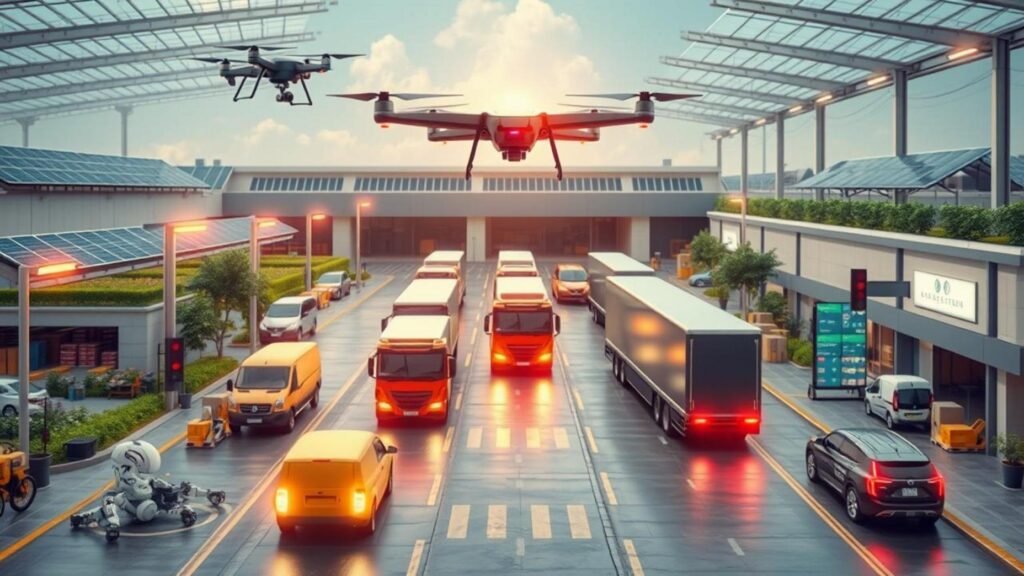Understanding Autonomous Systems: The Backbone of Smart Logistics

Autonomous systems have emerged as a transformative force in the realm of logistics, embedding advanced technologies into the fabric of modern supply chains. At their core, these systems rely on a combination of artificial intelligence (AI), machine learning, and robotics, allowing for significant improvements in efficiency and accuracy in logistics automation.
The Role of AI in Logistics Automation
AI plays a pivotal role in optimizing logistics operations. From predictive analytics that forecast demand to AI-driven robotics for warehousing and fulfillment, the implementation of these technologies is reshaping how goods are stored and distributed. For instance, companies are employing autonomous vehicles not only for transportation but also within warehouses for inventory management. This ensures a seamless flow of products, reducing waiting times and operational costs [Source: McKinsey].
Core Technologies Behind Autonomous Systems
Several foundational technologies drive the success of autonomous systems in logistics. These include:
- Machine Learning: This technology enables systems to learn from data and improve over time, facilitating real-time decision-making in supply chains.
- Robotics: Automated guided vehicles (AGVs) and drones are becoming increasingly common for sorting, packing, and delivering products, enhancing speed and accuracy.
- Internet of Things (IoT): IoT sensors provide critical data throughout the supply chain, allowing businesses to monitor conditions and track assets in real-time [Source: IBM].
Transforming Supply Chains
The integration of these technologies not only enhances efficiency but also improves resilience within the supply chain. By leveraging real-time data analytics and automation, businesses can respond swiftly to disruptions, thus maintaining service levels and customer satisfaction. As logistics automation continues to evolve, companies are poised to achieve higher visibility and agility, which are critical in today’s fast-paced market.
As we delve deeper into the implications of autonomous systems, it becomes clear that they are not just optional additions but essential enablers of sustainable and effective supply chain management in the modern landscape. For more insights on how AI is influencing various sectors, explore our article on Unlocking the Power of Artificial Intelligence.
Logistics Automation: Streamlining Operations with Autonomous Solutions
The integration of autonomous systems into logistics automation is revolutionizing warehousing operations. Companies are leveraging advanced technologies to enhance efficiency, reduce costs, and improve overall productivity. These technologies span robotics, AI, and IoT, each playing a pivotal role in transforming the logistics landscape.
Kiva Systems, now a subsidiary of Amazon, was one of the earliest adopters of autonomous robots in warehouse operations. Their automated guided vehicles (AGVs) navigate through the warehouse to retrieve products, significantly reducing the time needed for order fulfillment. This not only streamlines operations but also optimizes space utilization, allowing warehouses to maintain higher inventory levels without expanding their physical footprint.
Another prominent example is Walmart, which is investing heavily in AI-driven logistics systems. Their Intelligent Retail Lab uses autonomous sensors and cameras to monitor inventory in real-time, enabling quicker responses to stock levels and customer demand forecasting. This real-time data collection, augmented by AI analytics, fosters a responsive supply chain, minimizing out-of-stock situations and enhancing customer satisfaction.
Moreover, Microsoft has adopted autonomous solutions in their logistics operations. By implementing AI for predictive maintenance, the company can proactively address equipment malfunctions before they disrupt operations. This foresight leads to reduced downtime and operational cost savings, aligning with the ongoing trend of using AI in supply chain management.
As more organizations embrace logistics automation, the advantages of adopting autonomous systems in warehousing become increasingly evident. With their ability to enhance operational efficiency and streamline processes, businesses can not only keep pace with market demands but also gain a competitive edge in the ever-evolving landscape of logistics. For more insights on the intersection of technology and logistics, explore our discussion on AI’s Impact on Productivity.
AI in Supply Chain: Transforming Decision-Making and Efficiency
The integration of AI in supply chain management is revolutionizing how companies approach decision-making and operational efficiency. By leveraging predictive analytics and machine learning, businesses can unlock vital insights that lead to better performance, enhanced customer satisfaction, and significant cost savings.
One of the most powerful applications of AI is in demand forecasting. Traditional methods often relied on historical sales data, which could be erroneous or misleading due to changing market conditions. In contrast, AI-driven solutions can analyze vast datasets in real-time, considering factors such as seasonal trends, weather patterns, and social media sentiment. For example, companies like Forbes highlight how retailers use these advanced analytics to predict sales trends more accurately, enabling better inventory management and reducing wastage.
Enhancing Efficiency with Machine Learning
Machine learning algorithms also play a crucial role in optimizing logistics. They can identify inefficiencies in the supply chain processes, from warehouse operations to transportation routes. By assessing patterns and learning from past performance, these systems suggest improvements that lead to enhanced operational flow. For instance, logistics companies like Supply Chain Dive report that AI tools help firms like Amazon streamline their warehouses, reducing the time required to fulfill orders significantly.
Moreover, AI-driven solutions automatically adjust logistics strategies in response to real-time data. This is especially vital for companies that face fluctuating demand or unforeseen disruptions. By utilizing machine learning models that continuously improve based on new inputs, organizations can maintain resilience and adopt adaptive strategies in competitive markets.
Furthermore, the capabilities of logistics automation extend beyond mere analytics. Autonomous systems, such as self-driving vehicles and drones, are increasingly integrated into supply chain operations. These innovations not only reduce human errors but also lower operational costs while improving delivery times. As seen with firms exploring McKinsey, the transformative potential of autonomous systems is reshaping the very fabric of logistics.
In conclusion, the integration of AI within supply chain processes, from forecasting and planning to logistics execution, empowers companies to make data-driven decisions that enhance operational efficiency and drive competitive advantage. For more insights on leveraging AI tools effectively, check out our guide on AI Tools for Solopreneurs.
Enhancing Last-Mile Delivery through Autonomous Systems
The last mile of delivery—defined as the final leg of the logistics process from a distribution center to the end customer—presents a significant challenge in urban environments. As consumer expectations rise for fast and affordable delivery, innovative solutions utilizing autonomous systems, such as drones and self-driving vehicles, are being implemented to improve efficiency and reliability in logistics automation.
Autonomous Vehicles in Urban Areas
Self-driving vehicles are transforming the landscape of last-mile delivery by reducing human labor costs and operational inefficiencies. Companies like Mercedes-Benz have been testing autonomous vans equipped with advanced navigation systems to navigate complex urban settings. These vehicles utilize AI in supply chain management to ensure quick and safe deliveries, responding to dynamic road conditions and traffic patterns in real-time. As urban areas continue to face congestion, these autonomous delivery methods can alleviate pressure while maintaining timely service.
Drones Taking Flight
Drones are also emerging as a promising solution to last-mile delivery challenges. Companies like Amazon and UPS are pioneering drone technology to facilitate quick deliveries, especially in hard-to-reach areas. These aerial vehicles can bypass traffic constraints and deliver packages within minutes, significantly enhancing customer satisfaction. Moreover, advancements in drone technology have improved payload capacity and range, making them viable options for a variety of shipment needs.
Real-World Applications and Impact
Several case studies illustrate the successful implementation of these autonomous systems in last-mile delivery. For example, in Finland, autonomous robots have been deployed to carry groceries directly to consumers’ doorsteps, integrating seamlessly into everyday life. Similarly, companies like Gartner report that drones are increasingly being recognized as a strategic asset in logistics strategies, with businesses focusing on technology-driven improvements.
The integration of autonomous systems in last-mile delivery not only streamlines operations but also represents a shift towards sustainable logistics practices. By reducing the dependency on traditional delivery vehicles, companies are minimizing their carbon footprint and promoting eco-friendly solutions.
As the logistics industry continues to evolve, embracing innovations in autonomous systems is imperative. Those looking to stay ahead in this competitive landscape should explore how these technologies can be leveraged in their own logistics automation strategies. For additional insights on automation in delivery and other AI-driven solutions, consider reading more about the advantages of Automation Tools in modern business operations.
Future Trends: The Evolving Role of Autonomous Systems in Logistics
As logistics automation continues to advance, the role of autonomous systems is rapidly evolving, bringing forth several transformative trends that promise to reshape the supply chain landscape. Businesses are increasingly deploying autonomous vehicles, drones, and robotics, which are enhancing operational efficiencies, reducing costs, and improving service delivery.
Enhanced AI Integration in Supply Chain Management
One significant trend is the enhanced integration of artificial intelligence (AI) in supply chain management. AI systems are becoming pivotal in forecasting demand, managing inventory, and optimizing routing strategies. According to a report by McKinsey, companies that effectively utilize AI experience a 20 to 30 percent increase in operational efficiency due to improved decision-making and predictive analytics [Source: McKinsey].
In logistics, we see AI algorithms analyzing vast amounts of data from various sources—such as point-of-sale systems, social media trends, and weather patterns—to more accurately project inventory requirements. This trend toward data-driven decision-making is facilitating a more agile and responsive supply chain, allowing companies to adapt quickly to changing market conditions.
Autonomous Vehicles and Drones: Revolutionizing Last-Mile Delivery
Another notable trend is the deployment of autonomous vehicles and drones for last-mile delivery. These systems not only reduce dependency on human labor but also enable faster and more reliable deliveries. Amazon, for example, has been testing drones to deliver packages directly to customers’ doorsteps, cutting down on delivery times significantly [Source: Forbes].
By leveraging autonomous delivery systems, logistics companies can lower operational costs, enhance customer satisfaction, and minimize carbon footprints. The promise of reduced traffic congestion and lower emissions from autonomous vehicles aligns well with global sustainability goals, making this trend an essential facet of future logistics.
Increased Collaboration Between Autonomous Systems
In the quest for more efficient logistics operations, there’s a growing trend towards increased collaboration among autonomous systems. Integrating AI with the Internet of Things (IoT) allows these systems to communicate in real-time, share information, and coordinate tasks seamlessly. For instance, smart warehouses equipped with IoT sensors and autonomous robots can work in sync to fulfill orders rapidly and accurately.
As reported by PwC, the global logistics industry is expected to invest heavily in smart technologies, which will create a network of connected, autonomous systems capable of optimizing every aspect of the supply chain [Source: PwC]. This enhanced synergy between systems could vastly improve transparency and operational efficiency throughout the supply chain.
The future of logistics automation is undeniably intertwined with the evolution of autonomous systems. As these technologies develop, businesses must stay agile and adapt to the changing landscape to harness their full potential. This will not only streamline operations but also pave the way for more sustainable and resilient supply chains in the years to come.
For further insights on how AI is transforming different sectors, check out our post on Unlocking the Power of Artificial Intelligence.
Sources
- Forbes – How AI is Revolutionizing Supply Chain Management
- Gartner – 60% of Logistics Executives Are Paper
- IBM – IoT in Logistics
- Logistics Management – How Robo Warehouse Technology Costs Are Declining
- McKinsey – How AI is Transforming the Purchasing Process
- McKinsey – How AI Will Change the Future of Logistics
- Digihetu – AI Tools for Solopreneurs
- Supply Chain 247 – Case Study: 5 Ways Microsoft is Using AI to Drive Logistics in Their Warehouses
- Supply Chain Dive – Why Amazon Uses AI for Warehouse Optimizations
- PwC – Transportation and Logistics 2020
- Mercedes-Benz – Equipped for Urban Delivery: Autonomous Vans
- Wired – Why Walmart’s Warehouses Are About to Get Smarter
- Amazon – Drone Delivery
- UPS – Drone Delivery
- InformationWeek – IoT Technology Streamlines Last Mile Delivery
- Digihetu – 10 Best Free Automation Tools That Will Transform Your Workflow


